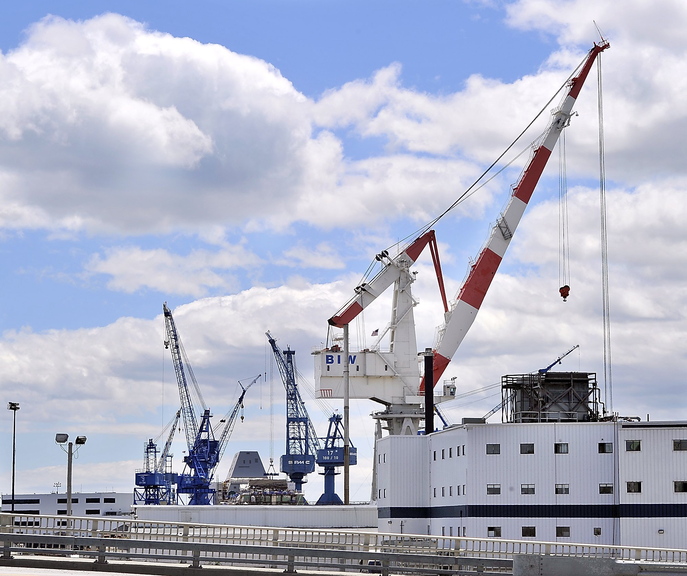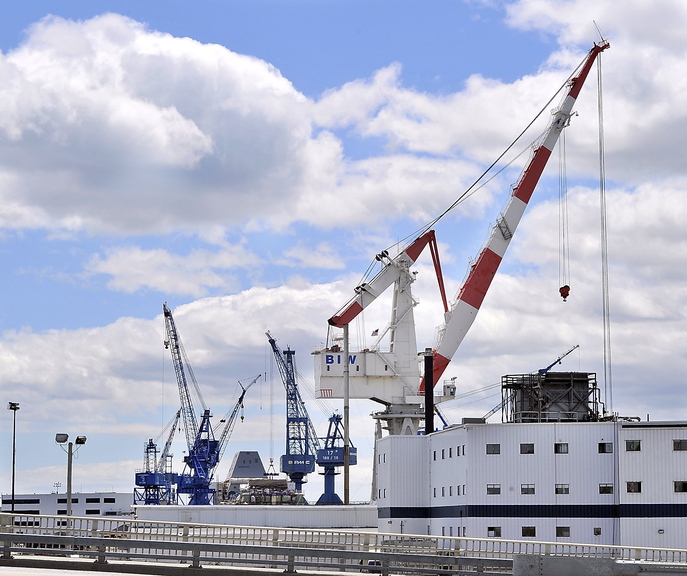Bath Iron Works will receive a property tax break of roughly $3.7 million from the city of Bath to build a new outfitting hall at the south end of the shipyard.
The Bath City Council on Wednesday approved a 15-year tax rebate for BIW that is expected to save the company about $265,000 annually for the first 10 years and an additional $212,000 annually for the following five years.
The nine-member council voted 7-1 with Councilor David Sinclair voting against the measure. Council Chairman Bernard Wyman only votes in the event of a tie.
Sinclair had suggested two amendments to the tax rebate deal, one that would have reduced it to $2.5 million over 10 years, and another that would have eliminated it in the event of layoffs at BIW.
Both were rejected overwhelmingly by the other councilors.
Still, the council did amend BIW’s original proposal, which would have resulted in a tax break of $6.3 million over a 25-year period.
Several councilors commented that the reduced tax break seemed fairer to the city and its taxpayers.
A vocal group of Bath residents had lobbied against the proposed tax rebate, calling it corporate welfare and arguing that BIW was certain to build the expansion regardless of whether it received a tax break.
Officials at BIW, a subsidiary of the Virginia-based defense and aerospace firm General Dynamics, had said it was possible that if a tax break was denied, the company might not be able to expand the facility, putting local jobs at risk.
The proposed expansion includes a $32 million outfitting hall that company officials say would help secure the future of shipbuilding in Bath. The company was seeking a 25-year city property tax subsidy of about $250,000 a year for the proposed expansion.
Both opponents of the tax break and BIW officials said they were satisfied with the council’s compromise vote.
“I feel really good about the whole process,” said Jerry Provencher, one of the tax rebate’s leading opponents. “I think (the opponents’ efforts) helped inform the dialog that happened in the city.”
Dozens of Bath residents came to the two public hearings and a panel discussion to speak for or against the tax break. Council meetings and a forum hosted by opponents had standing-room-only crowds.
BIW Vice President and General Counsel Jon Fitzgerald said the company saw the council’s vote as a positive one.
“We understand this is a public process,” he said.”The company appreciates the consideration of the council, and ultimately the support of the council.”
The Bath City Council vote came in the form of an amendment to the city’s Wing Farm tax increment financing district.
The Wing Farm district is at the south end of the shipyard, where the proposed outfitting hall would be built.
The outfitting hall would allow many BIW employees who now work outdoors to move into a climate-controlled facility, company officials have said. This would be less hazardous, more comfortable for workers and improve efficiency, they said.
Bath created the Wing Farm district in 2008 to protect the city from losing its existing share of state revenue as a result of BIW’s most recent expansion, which included its two-bay Ultra Hall outfitting facility.
Normally, when the value of property within a municipality goes up, the amount of state shared revenue the municipality receives goes down. Establishing a tax increment financing district shields the municipality from losing state money because of property value increases within the district.
Such a district most often is used as a vehicle to provide a tax subsidy on private development within the district, such as a new shopping center or housing complex. The municipality gets to keep its state revenue sharing, and the developer is refunded part of its yearly municipal tax bill.
Still, the net result of most tax increment financing districts is that the municipality receives less tax revenue than it would if the development had occurred outside the district. Districts nearly always benefit the property owner and often are used as an incentive to lure new development to the area.
The Wing Farm district was an exception. It provided BIW with no tax break until Wednesday.
Under the approved amendment, that has changed to a 50-50 split between BIW and the city on the improved property’s estimated $530,000 annual tax burden for 10 years, and a 60-40 split in favor of Bath for the following five years.
The tax break only applies to new development.
It does not affect the amount of property taxes paid by BIW on land and equipment for the majority of the shipyard, which falls outside the Wing Farm district.
The rest of the yard is divided into two additional districts related to previous BIW expansions that already provide property tax breaks to the company. Those districts were established in 1999 and will expire in 2024.
J. Craig Anderson can be contacted at 791-6390 or at:canderson@pressherald.comTwitter: @jcraiganderson
Send questions/comments to the editors.





Success. Please wait for the page to reload. If the page does not reload within 5 seconds, please refresh the page.
Enter your email and password to access comments.
Hi, to comment on stories you must . This profile is in addition to your subscription and website login.
Already have a commenting profile? .
Invalid username/password.
Please check your email to confirm and complete your registration.
Only subscribers are eligible to post comments. Please subscribe or login first for digital access. Here’s why.
Use the form below to reset your password. When you've submitted your account email, we will send an email with a reset code.